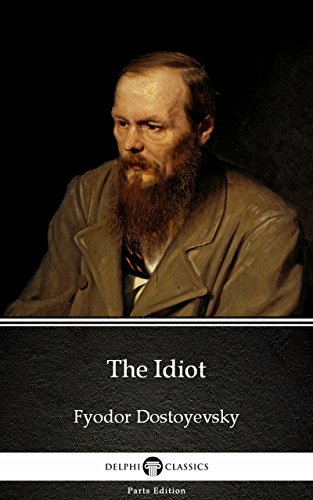The Idiot by Fyodor Dostoyevsky - Delphi Classics (Illustrated) (Delphi Parts Edition (Fyodor Dostoyevsky) Book 11)
Fyodor Dostoyevsky
BOOK REVIEW

In The Idiot, Fyodor Dostoyevsky doesn't just write a novel; he crafts a magnum opus that pierces through the fabric of societal norms and explores the very essence of humanity. Set against the backdrop of 19th-century Russia, his tale intertwines the lives of complex, vividly rendered characters who grapple with morality, love, and the haunting shadows of their own flaws. This isn't merely a story; it's a visceral plunge into the heart of existentialism, empathy, and what it means to be perceived as "the idiot" in a world that often prioritizes superficiality over true understanding.
At the center lies Prince Lev Nikolayevich Myshkin, whose innocence is both a blessing and a curse. Myshkin's character is a reflection of the Christ-like figure, a beacon of compassion in an often ruthless society. Yet this purity draws scorn and disbelief from those around him. He becomes entangled in a web of obsession, envy, and jealousy, particularly with the fascinating Nastasya Filippovna and the passionate Parfyon Rogozhin. Dostoyevsky crafts these relationships with such depth that readers can't help but feel the tug-of-war of emotions-love, hatred, longing, and despair.
Throughout this 916-page labyrinth of vivid prose, Dostoyevsky invites you to question your own judgments and perceptions. Can one truly be called an "idiot" for embodying kindness in a heartless world? The beauty of this narrative is found not in answers, but in the exploration of questions that resonate with the human condition. The interactions between Myshkin and the other characters mirror our own societal dilemmas, pushing us to confront our biases, perceptions of sanity, and the very purpose of our existence.
Critics and readers alike have lauded The Idiot, noting how it captures the melancholic spirit of Dostoyevsky's era, where deep philosophical musings were often overshadowed by social critique. While some readers find Myshkin's naivety frustrating-a trait that leads to his suffering-others view it as a mirror reflecting the darker aspects of human nature. The discord in opinions serves to highlight the complex layering of themes that Dostoyevsky masterfully intertwines throughout the narrative.
As you delve deeper, the commentary on societal norms becomes hard to ignore. Dostoyevsky keenly dissects the hypocrisy present in the upper echelons of Russian society, where appearance often takes precedence over authenticity. What makes this novel so relevant today is the ongoing struggle against societal facades and the quest for genuine connection in an age dominated by digital personas.
The emotional weight of The Idiot resonates profoundly, with readers reporting feelings of compassion, frustration, and enlightenment. The haunting love triangle captivates the imagination, with the stakes feeling painfully real; the reader is left grappling with their own emotions long after the last page has been turned. It's not uncommon to find individuals in online forums debating whether they relate more to the princely Myshkin, tormented by the weight of his kindness, or the fiery Rogozhin, consumed by a darker passion.
Dostoyevsky's own turbulent life experiences inform the narrative's somber yet enlightening themes. Having faced poverty, mental health struggles, and a tumultuous relationship with society, the author's insights breathe authenticity into Myshkin's journey. The resonance of these themes-mental health, morality, and the quest for personal identity-reveals just how timeless Dostoyevsky's work truly is.
As the final pages draw near and the tension between the characters reaches its apex, one may not only feel as if they've traversed the landscape of 19th-century Russia but also uncovered a mirror reflecting their own life experiences, challenges, and societal roles. Engaging with The Idiot is more than reading; it's a confrontation with the self, a call to introspection that promises to leave you breathless and yearning for more. 🌌
Ultimately, Dostoyevsky's The Idiot holds a dark, compelling beauty. It challenges societal norms, explores the depths of human emotion, and compels us to reconsider our own humanity. In a world often filled with pretense, this work dares to embrace the purity of the human spirit, urging us to see the beauty in vulnerability and truth. So, as you embark on this journey through Myshkin's eyes, prepare to explore not just the pages of a novel but the very essence of what it means to be alive.
📖 The Idiot by Fyodor Dostoyevsky - Delphi Classics (Illustrated) (Delphi Parts Edition (Fyodor Dostoyevsky) Book 11)
✍ by Fyodor Dostoyevsky
🧾 916 pages
2018
#idiot #fyodor #dostoyevsky #delphi #classics #illustrated #delphi #parts #edition #fyodor #dostoyevsky #book #fyodor #dostoyevsky #FyodorDostoyevsky